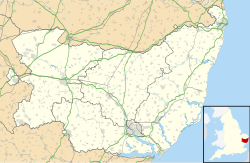| Moulton | |
|---|---|
 Moulton, Church of St Peter | |
Location within Suffolk | |
| Area | 12.92 km2 (4.99 sq mi) |
| Population | 1,033 (2011) [1] |
| • Density | 80/km2 (210/sq mi) |
| OS grid reference | TL699643 |
| District | |
| Shire county | |
| Region | |
| Country | England |
| Sovereign state | United Kingdom |
| Post town | NEWMARKET |
| Postcode district | CB8 |
| Dialling code | 01638 |
| Police | Suffolk |
| Fire | Suffolk |
| Ambulance | East of England |
| UK Parliament | |

Moulton is a village and civil parish in the West Suffolk district of Suffolk in eastern England, located close to the town of Newmarket. It pre-dates the 1086 Domesday Book and, in 2005, it was estimated to have a population of 1090. [2] 1,033 people were recorded at the 2011 census. [1]
Contents
- John Gower connection
- Notable residents
- People
- Horses
- Facilities
- Public House
- References
- External links

The village is older than the now larger town of Newmarket and includes a 15th-century packhorse bridge spanning the River Kennett. This is one of two such bridges in Suffolk, with the other being located in the neighbouring village Kentford. The bridge is a grade II* listed structure [3]
Moulton also has a fine church, St. Peter's, with an early 14th-century tower topped by a gilded weather vane in the shape of a large pike by blacksmith Charles Poulter. [4] Restored in 1851, it is a grade I listed building. [5]
